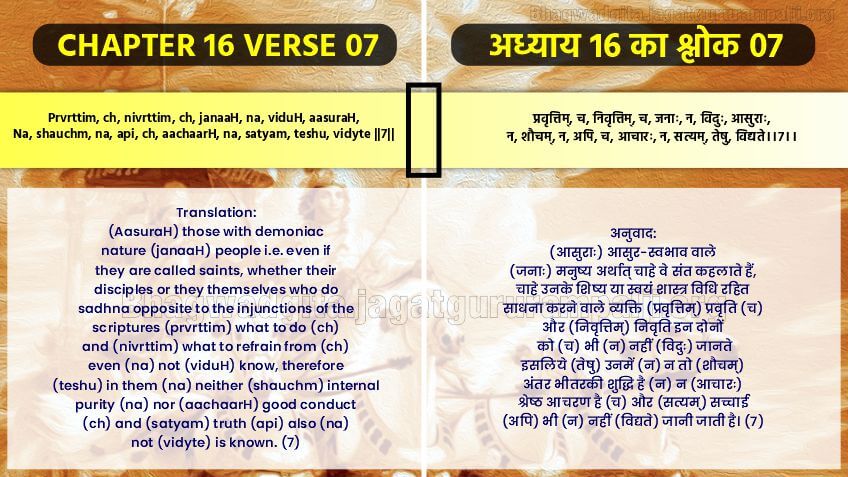
Prvrttim, ch, nivrttim, ch, janaaH, na, viduH, aasuraH,
Na, shauchm, na, api, ch, aachaarH, na, satyam, teshu, vidyte ||7||
Translation: (AasuraH) those with demoniac nature (janaaH) people i.e. even if they are called saints, whether their disciples or they themselves who do sadhna opposite to the injunctions of the scriptures (prvrttim) what to do (ch) and (nivrttim) what to refrain from (ch) even (na) not (viduH) know, therefore (teshu) in them (na) neither (shauchm) internal purity (na) nor (aachaarH) good conduct (ch) and (satyam) truth (api) also (na) not (vidyte) is known. (7)
Translation
The people with demoniac nature, even if they are called saints, whether their disciples or they themselves, who do sadhna opposite to the injunctions of the scriptures, do not even know what to do and what to refrain from ; therefore, neither they have internal purity, nor good conduct and also truth is not known.
Important: In Gita Adhyay 15 Shlok 15 and Adhyay 9 Shlok 17, the meaning of VedyaH and Vedyam has been given as ‘To know’.
प्रवृत्तिम्, च, निवृत्तिम्, च, जनाः, न, विदुः, आसुराः,
न, शौचम्, न, अपि, च, आचारः, न, सत्यम्, तेषु, विद्यते।।7।।
अनुवाद: (आसुराः) आसुर-स्वभाववाले (जनाः) मनुष्य अर्थात् चाहे वे संत कहलाते हैं, चाहे उनके शिष्य या स्वयं शास्त्र विधि रहित साधना करने वाले व्यक्ति (प्रवृत्तिम्) प्रवृति (च) और (निवृत्तिम्) निवृति इन दोनांेको (च) भी (न) नहीं (विदुः) जानते इसलिये (तेषु) उनमें (न) न तो (शौचम्) अंतर भीतरकी शुद्धि है (न) न (आचारः) श्रेष्ठ आचरण है (च) और (सत्यम्) सच्चाई (अपि) भी (न) नहीं (विद्यते) जानी जाती है। (7)
विशेष:- गीता अध्याय 15 श्लोक 15 तथा अध्याय 9 श्लोक 17 में वेद्यः या वेद्यम् का अर्थ जानना किया है।
